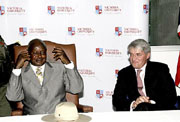-
(单词翻译:双击或拖选)
Ugandan President Chastises1 Universities Over 'Non-Marketable' Classes
Uganda's universities normally face leadership challenges but now they face a challenge from the country's leader. In speeches across the country, Ugandan President Yoweri Museveni has been chastising2 them for offering courses - such as literature, development studies and conflict resolution - which he thinks the local job market has no room for.
Instead, Museveni is urging Ugandan universities and students to focus their resources on the sciences, information technology and business.
Exact statistics are not available, but some estimates put the youth unemployment rate as high as 32 percent, and, surprisingly, 36 percent among university graduates.
At a recent awards ceremony, Museveni said students can't expect to get jobs if they study the wrong subjects.
"The problem is not jobs, the jobs are there," said Museveni. "What is crucial are the skills. There has been a course at Makarere called Conflict Resolution. OK, but what will you do when the conflicts are finished? This unemployment you are talking about . Is it unemployment or is it employability? Is it that you are unemployed3, or is it that you are not employable because you have got skills which are not needed on the market?"
 |
| Uganda President Yoweri Museveni, left, with the UK Secretary of State for International Development Andrew Mitchell, right, at the opening of Victoria University in Uganda capital Kampala, September 10, 2011 (file photo). |
But Professor Paddy Musana, head of the Peace and Conflict Studies program at Makarere University in Kampala, argues that his subject is crucial in a country like Uganda, which lies at the heart of the volatile4 Great Lakes region.
"This is a hot spot of conflicts," noted5 Musana. "If you are going to study the history of Rwanda, if you are going to study the reality of Congo, if you are going to look at 2007 in Kenya, if you are going to look at the case of Sudan - let's look at the countries around us. Now let's come back to Uganda and its political evolution - we are a county that has been shaped by conflicts. So I take it as an unfortunate statement attacking or trying to undermine a course that is very relevant. There is a direct relationship between peace and development."
At Makarere University, students are divided over whether or not focusing on marketable courses would be good for the country. One arts student thought it definitely would not.
"If they are only producing scientists then the arts industry will fail," she said. "Because we don't need only doctors, only computer specialists - we need the social sciences, the arts, the communicators."
But a group of finance students nearby approved of the president's recommendations, arguing that a focus on marketable courses would improve employment prospects6 for everyone.
"It will help a few students who are taking them, and I believe with time we shall get more jobs created, compared to just doing many courses in the university and to then go out there looking for things to do in vain," he said.
Teshome Alemneh, of the Washington-based agency Higher Education for Development, says the problem is the Ugandan president's narrow definition of marketability. This leaves out courses like agriculture, teacher training and conflict resolution, which, he says are not where the most jobs are to be found, but which are nonetheless very important.
"Students are not choosing these programs because they are not really marketable, but these are areas that nations and countries need for their development," Alemneh explained. "Conflict resolution, for example, is very important in many sub-Saharan African countries, in terms of human resources that can foster peace and security and development in these nations. So I would argue national governments should also encourage people to enroll7 in these other disciplines."
In a country where suspicion of the government runs deep, not everyone is convinced that Museveni has the students' best interests at heart. One philosophy student said he thinks the president's ideas on education have more to do with trying to maintain his own hold on power, than with education itself.
"If you promote only natural sciences and you don't promote subjects like philosophy and history, you are not promoting people's reasoning," said Museveni. "For example, our government is corrupt8, but if you promote only natural sciences people won't be knowing that the government has got corrupt members within the state."
Yet another thinks that the recent push for more marketable courses is merely intended to distract the public from the fact that the government itself has failed to tackle the country's stubbornly high unemployment rate.
"He has failed to provide the jobs for the youth, so he is using this as a blind spot so that he can divert our minds to other things," she added. "But what he has to do is provide for us enough jobs."
A Makarere spokeswoman said that the university has not yet received any specific instructions from the Ministry9 of Education. But if necessary, she says, they would be willing to review the arts and social sciences curricula, taking into account the needs of potential employers.
 收听单词发音
收听单词发音
1
chastises

|
|
| v.严惩(某人)(尤指责打)( chastise的第三人称单数 ) | |
参考例句: |
|
|
|
2
chastising

|
|
| v.严惩(某人)(尤指责打)( chastise的现在分词 ) | |
参考例句: |
|
|
|
3
unemployed

|
|
| adj.失业的,没有工作的;未动用的,闲置的 | |
参考例句: |
|
|
|
4
volatile

|
|
| adj.反复无常的,挥发性的,稍纵即逝的,脾气火爆的;n.挥发性物质 | |
参考例句: |
|
|
|
5
noted

|
|
| adj.著名的,知名的 | |
参考例句: |
|
|
|
6
prospects

|
|
| n.希望,前途(恒为复数) | |
参考例句: |
|
|
|
7
enroll

|
|
| v.招收;登记;入学;参军;成为会员(英)enrol | |
参考例句: |
|
|
|
8
corrupt

|
|
| v.贿赂,收买;adj.腐败的,贪污的 | |
参考例句: |
|
|
|
9
ministry

|
|
| n.(政府的)部;牧师 | |
参考例句: |
|
|
|















